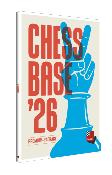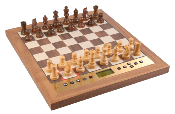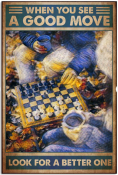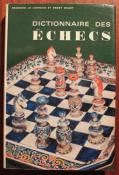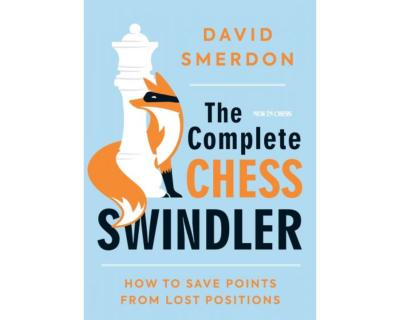 Chess is a cruel game. We all know that feeling when your position has gone awry and everything seems hopeless. You feel like resigning. But don’t give up! This is precisely the moment to switch to swindle mode.Master the art of provoking errors and you will be able to turn the tables and escape with a draw – or sometimes even steal the full point!Swindling is a skill that can be trained. In this book, David Smerdon shows how you can use tricks from psychology to marshal hidden resources and exploit your opponent’s biases.In a lost position, your best practical chance often lies not in what the computer recommends, but in playing your opponent.With an abundance of eye-popping examples and training exercises, Smerdon identifies the four best friends of every chess swindler: your opponent’s impatience, their hubris, their fear, and their need to stay in control.You’ll also learn about such cunning swindling motifs as the Trojan Horse, the Decoy Trap, the Berserk Attack, and ‘Window-Ledging’.So, come and join the Swindlers’ Club, become a great escape artist and dramatically improve your results. In this instructive and highly entertaining guide, Smerdon shows you how.David Smerdon is an Australian chess grandmaster and behavioral economist. In 2015 he published the highly successful chess opening book Smerdon’s Scandinavian."An absorbing read that will provide inspiration for any player who wants to start the great escape when losing. An enjoyable way to discover the secrets of rescuing bad positions.” IM Gary Lane, Chess Moves Magazine"This is quite a chunky book but it reads like a charm. It is both a litany of chess disasters and a guide to how to make them happen in your own games (to your opponent of course!). It’s great book written with humour and compassion and I hope I learned a lot from it.” GM Matthew Sadler, author of ‘Game Changer’"A swindle must be started actively. The most important rule is that you realize in time when you are lost. Smerdon has lots of tips, of which I particularly like: ‘give your opponent what he wants. By faking that you are allowing it to happen by accident, your opponent doesn’t see that you have inserted a devilish trick.” Johan Hut, Noord-Hollands Dagblad"It’s not just entertaining, it’s highly instructive as well. Well-structured and didactic, the human psychology of swindling is broken down into very clear themes. I cannot recommend this book highly enough. It fills a real gap in chess literature.” GM Daniel King"The book shines with terrific examples and explanations. I have to recommend it to every chess friend, because the next lost position could come sooner than expected!” IM Dirk Schuh"Smerdon has divided his material neatly into digestible chunks. He explains every element in a clear and effective way. His methodology for finding a swindle is based on three questions: what is my opponent’s goal, how does he want to reach it, and what is the positive element in my bad position. Smerdon knows how to teach, his style is always fluent and full of humour. Do yourself a favour and buy this book.” Barry Braeken, Schaaksite"An entertaining treatise on the art of saving lost positions. Smerdon, who has an engaging writing style, has put in a lot of work to find the appropriate material for this dastardly art. Excellent exercises section at the end of the book.” GM Michael Adams, The Daily Telegraph"Most of the anecdotes, with wonderful and astonishing climaxes, were new to me. Smerdon’s selection of games and fragments is excellent. The book is attractive and entertaining, and absolutely worth reading!.” IM Frank Zeller, Schach-Magazin 64"The examples of the swindles are extremely entertaining. Smerdon is a very good writer; this book is fully accessible to all levels, but never crosses the line into dumbed-down territory. It is thoroughly instructive and extremely entertaining.” Sean Marsh, CHESS Magazine"Smerdon is the first to treat the subject of swindling in a logical and systematic manner, but it is his choice of examples, well-known and obscure, that make the book shine.” GM Ian Rogers, The Byron Shire Echo. Chess is a cruel game. We all know that feeling when your position has gone awry and everything seems hopeless. You feel like resigning. But don’t give up! This is precisely the moment to switch to swindle mode.Master the art of provoking errors and you will be able to turn the tables and escape with a draw – or sometimes even steal the full point!Swindling is a skill that can be trained. In this book, David Smerdon shows how you can use tricks from psychology to marshal hidden resources and exploit your opponent’s biases.In a lost position, your best practical chance often lies not in what the computer recommends, but in playing your opponent.With an abundance of eye-popping examples and training exercises, Smerdon identifies the four best friends of every chess swindler: your opponent’s impatience, their hubris, their fear, and their need to stay in control.You’ll also learn about such cunning swindling motifs as the Trojan Horse, the Decoy Trap, the Berserk Attack, and ‘Window-Ledging’.So, come and join the Swindlers’ Club, become a great escape artist and dramatically improve your results. In this instructive and highly entertaining guide, Smerdon shows you how.David Smerdon is an Australian chess grandmaster and behavioral economist. In 2015 he published the highly successful chess opening book Smerdon’s Scandinavian."An absorbing read that will provide inspiration for any player who wants to start the great escape when losing. An enjoyable way to discover the secrets of rescuing bad positions.” IM Gary Lane, Chess Moves Magazine"This is quite a chunky book but it reads like a charm. It is both a litany of chess disasters and a guide to how to make them happen in your own games (to your opponent of course!). It’s great book written with humour and compassion and I hope I learned a lot from it.” GM Matthew Sadler, author of ‘Game Changer’"A swindle must be started actively. The most important rule is that you realize in time when you are lost. Smerdon has lots of tips, of which I particularly like: ‘give your opponent what he wants. By faking that you are allowing it to happen by accident, your opponent doesn’t see that you have inserted a devilish trick.” Johan Hut, Noord-Hollands Dagblad"It’s not just entertaining, it’s highly instructive as well. Well-structured and didactic, the human psychology of swindling is broken down into very clear themes. I cannot recommend this book highly enough. It fills a real gap in chess literature.” GM Daniel King"The book shines with terrific examples and explanations. I have to recommend it to every chess friend, because the next lost position could come sooner than expected!” IM Dirk Schuh"Smerdon has divided his material neatly into digestible chunks. He explains every element in a clear and effective way. His methodology for finding a swindle is based on three questions: what is my opponent’s goal, how does he want to reach it, and what is the positive element in my bad position. Smerdon knows how to teach, his style is always fluent and full of humour. Do yourself a favour and buy this book.” Barry Braeken, Schaaksite"An entertaining treatise on the art of saving lost positions. Smerdon, who has an engaging writing style, has put in a lot of work to find the appropriate material for this dastardly art. Excellent exercises section at the end of the book.” GM Michael Adams, The Daily Telegraph"Most of the anecdotes, with wonderful and astonishing climaxes, were new to me. Smerdon’s selection of games and fragments is excellent. The book is attractive and entertaining, and absolutely worth reading!.” IM Frank Zeller, Schach-Magazin 64"The examples of the swindles are extremely entertaining. Smerdon is a very good writer; this book is fully accessible to all levels, but never crosses the line into dumbed-down territory. It is thoroughly instructive and extremely entertaining.” Sean Marsh, CHESS Magazine"Smerdon is the first to treat the subject of swindling in a logical and systematic manner, but it is his choice of examples, well-known and obscure, that make the book shine.” GM Ian Rogers, The Byron Shire Echo.
David Smerdon
New in Chess
359 pages

|






